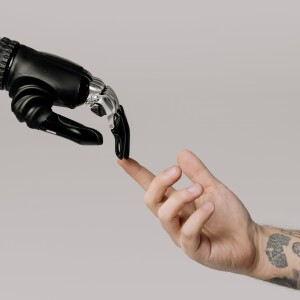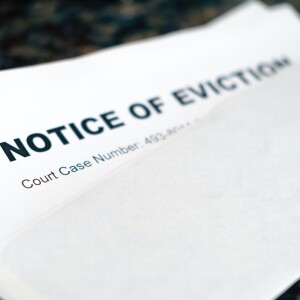Solutions for the Underaffiliated
Solutions for the Underaffiliated is a podcast for people who want hope and action because they are fed up with finger-pointing and incivility. We represent action, by providing examples of it. Its purpose is to inspire people through the examples our guests from the region, state, and country describe. We talk about potential solutions related to: climate change, economic opportunity, education, rights and justice, healthcare, and public safety. During each episode, we lay out the current state of a particular issue from the perspective of our guest. Then we lay out the challenges, usually through a review of the key stakeholder, e.g. government, industry, the media, special interests, and regular Americans. We identify what needs to change. Then we explore solutions that are either already underway by the group or guest as well as actions our audience could take to influence change and hold people accountable.
Episodes

Saturday Jan 13, 2024
Saturday Jan 13, 2024
— There are so many issues for Americans to take on, your government is tackling none of them, we need to stop playing along.
— Why we struggle to fix our own mental health, but how we can try. Little things to cope with anxiety and stress
— Generational differences explained, and why aren’t we building a future for our kids instead of old folks lining to a past they can’t get back?
— Little things to cope with anxiety and stress

Wednesday Dec 13, 2023
Wednesday Dec 13, 2023
Will we turn over our faith to AI, just like we accept religion?
Both AI and religion are based on our imagination. We created religion to believe in something to control our lives. We created AI to increase productivity … if you do the full “why?” analysis.
What happens when we live under the ruthless control of an AI productivity god?
We feed religion with blind faith. We feed AI with data about what we eat, search for, listen to , talk about, love, hate, create, destroy. We give all the formulas for what we build, so it can learn to make them better and faster.
We trust AI, like we trust a god. Yet we created both.
Maybe trust each other a little more. Maybe trust nature a little more.
Our imaginations are powerful. Maybe we shouldn’t let what we create rule us.

Thursday Nov 30, 2023
Thursday Nov 30, 2023
Race matters in college admissions because the more races we have sharing their perspectives and experiences, the better leaders the United States produces to make decisions that benefit us all, not just a portion of us.
Corporations know this because they get innovation and leadership by ensuring diverse perspectives work for them.
The Supreme Court of the United States used the 14th amendment — specifically designed to help Black Americans to escape the dehumanization of slavery — to remove race as a consideration from college admissions.
Our guest, Michael Ross, a Professor of History at the University of Maryland at College Park, specializes in the U.S. Constitutional and Legal History.
He argues that the court knows that the 14th Amendment is designed to protect Black people.
Instead, though, it uses the 14th Amendment to argue against race being a factor in college admissions. The decision could be used to undermine any proposed effort to argue for race being a factor in policy-making.
Ross is the author of two prize-winning books: Justice of Shattered Dreams: Samuel Freeman Miller and Supreme Court during the Civil War Era and The Great New Orleans Kidnapping Case: Race, Law, and Justice in the Reconstruction Era.
He serves as associate editor of the Journal of Supreme Court History, has served as the historical advisor to the United States Mint, and has twice delivered Silverman lectures at the United States Supreme Court. He holds a J.D. from the Duke University School of Law and earned a Ph.D. in History at the University of North Carolina at Chapel Hill.

Thursday Nov 09, 2023
Thursday Nov 09, 2023
Let’s enable all Americans to achieve their goals by providing them with opportunities to earn an income that allows them to pay for housing, transportation and necessary goods and services — like food — without going into excessive credit card debt.
Insufficient wages, affordable housing, and public transportation are three examples of why so many of our fellow Americans operate their households at a loss. When you are barely eating, behind on bills or going into debt, you are unhappy and less productive. Crime, trauma, and substance abuse increases.
When you can only afford to live far from work, traffic and pollution get worse — more traffic means more carbon in the sky — while natural habitat continues to be cleared and cities become ghost towns replaced by more sprawling concrete jungles.
That has a negative impact on business productivity and satisfaction with politicians and government — the American way of life.
Sure. Increasing wages can drive up expenses potentially hurting profits. Affordable housing in urban areas could negatively impact home values and increase crime and congestion.
If more people have money left over after paying for housing, transportation and basic needs, productivity increases and peace-of-mind spreads. That can lead to less turnover and absenteeism and lower recruiting and development costs.
If affordable housing comes with appropriate maintenance rules, public transportation, and zoning for new stores, property values will be fine. Crime will not be a problem.
We have outlined some ways to increase all of our productivity by reducing the financial and psychological stress created by insufficient wages, high rent and mortgages, and limited public transportation.
But what is the obligation of real estate developers and owners and business executives to ensure all Americans have a living wage, affordable housing, and public transportation?
Should policies be developed to hold them accountable for rising crime, drug use, environmental degradation, homelessness and other social drivers of health because of their practices?
What do we want to do about a way of life that drives up the cost of living, so we can’t afford to be our best?
The next steps are up to you.

Monday Nov 06, 2023
Monday Nov 06, 2023
We talked about improving the quality of life from the perspective of a former Air Force pilot and family physician-turned-urgent-care-doctor.
Dr. Worthe Holt has cared for patients, led health system operations, was the Deputy Chief Medical Officer for a large health insurance company.
He served as a pilot in the United States Air Force, and as Major General, Special Assistant to the Commander, and Deputy Chief of Staff, in the United States Africa Command.
More people need care, but put it off, go to urgent care clinics, or simply don't get it. All that drives up costs.
1. There is a higher rate of chronic conditions like diabetes, hypertension, and heart problems. Sometimes it’s because people choose to drink too much, smoke, eat unhealthy foods, and not exercise. Sometimes it’s not a choice.
2. People live longer, and require more care as they age.
3. Social drivers can make poor health worse. Living where there is no place to get healthy food, living alone, or not having transportation make it difficult for people to take care of themselves and get to the care they need.
Further, social drivers lead to mental health issues because they create anxiety and depression as people struggle to survive.
4. People often can’t get an appointment to see a primary care doctor in a timely manner.
5. Health insurance companies encourage people to go to a primary care doctor and discourage them from going to the emergency department.
It is not clear that the government can effectively and efficiently single-handedly fix and pay for health care.
Urgent clinics have an unplanned, out-sized role in healthcare
We are asking the clinical community to help reduce costs and solve for social problems.
A doctor can provide guidance and treatment options to help prevent people from developing chronic conditions or to slow their progress.
Doctors can’t control what people do outside of the office, nor how the world around them influence their behavior.
Urgent clinics that were supposed to serve as a primary care release now provide a range of disparate care and often look more like an emergency department than a primary care clinic.
This kind of utilization seems to indicate that costs are so high and access so poor that people are waiting until their condition is so bad that only urgent care will solve it.
Solutions
We need to be empathetic of people in need of health care. It is frustrating and scary for people who are in crisis or have children in crisis. Lack of access and high costs just make the suffering worse.
We should be encouraging people to take care of themselves, not criticizing them — or defending their “right” to live how they want.
People know that they should not smoke or drink too much and eat more healthy food and exercise more.
It’s ok for doctors to recommend behavior-change, but make it manageable. They don’t have to run a marathon. They can take a walk. They don’t need to change everything they eat. They need to swap a few things, like fruits and vegetables instead of pre-made, processed meals.
At the same time, people should demand access and affordability, while engaging in healthier behavior.
Health systems and drug companies setting prices for health care services and drugs AND insurance companies designing the co-pays and deductibles should be held accountable.
Unless we address high costs and limited access, plus a chronically ill and aging population together, more people will likely need urgent care because they can’t afford routine care.
More about Dr. Holt
He flew the F-4 Phantom and F-16 during military operations and helped design plane technology so pilots could operate high-performance jets, while their bodies go through the physiological changes they experience.
After he retired, he went from a volunteer, developing training programs for resident physicians to practicing urgent care.

Sunday Oct 29, 2023
Sunday Oct 29, 2023
Sometimes, the price of not earning enough money is not being able to pay rent and ultimately eviction.
Many Americans are making trade-offs between food, bills and housing. In emergencies, paying rent might have to come last.
We spoke with Charles Koepp, an eviction defense attorney in New York City, to learn lessons about ways to support people facing eviction.
Most evictions are due to nonpayment
Without representation, people have to go to court and stay there to file their paperwork. That’s a day away from work, which often costs people wages when they don’t have money to pay rent in the first place.
There are so many eviction cases that landlords’ attorneys are slammed. Lawyers like Mr. Koepp are not practicing law as much a helping people navigate the legal system.
Are rents too high? Are there too few rentals available to meet demand?
Do people not earn enough?
Is there ill-intent? Are landlords pushing the limits of what the market will bear without regard to people’s lives?
In some cases, landlords do want to get people out so they can raise the rent.
In New York, new legislation guarantees that tenants have the right to obtain counsel in eviction proceedings.
New York’s law reflects the belief that housing is a right, so people deserve the benefit of an expert to help them navigate the system. New York also offers people a subsidy, which pays the rent while they look for a new place to live.
What does your state seem to believe?
If people are concerned about being evicted, keep proof that you paid rent and the communications between you and the landlord about paying rent.
If you have been evicted, call a non-profit legal services organization in our town to help you navigate the legal system. There could be options you don’t know about.
Maybe the government could even explain and educate people about the available options to help them figure it out

Saturday Oct 21, 2023
Saturday Oct 21, 2023
Why not ask what it's like to be like on the other side of any fight? Instead pointing fingers to defend our aggression because "they started it," why not see the other side as people -- just like you?
We examined the history of the Jewish faith and its people to understand their perspective and response to attacks on them -- and the irony of how they use their power in light of the principles of their faith.
The lessons we can learn are not only within the context of the conflict in Gaza.
We spoke with Jeremy Phillips, an Instructor of Religion and Humanities at Haywood Community College and Humanities Instructor at UNC-Asheville. He has a Master of Divinity in Theology and Biblical studies.

Sunday Oct 15, 2023
Sunday Oct 15, 2023
If we want peace in the Middle East, the United States, or anywhere, we need to demand and cultivate leaders with a vision for a future (not a past), that builds on our one-ness, using our differences as ways to learn and grow, and not to divide us to gain power.
We let religion, race, gender, culture -- anything -- divide us, and political leaders capitalize on that, leading to injustice and war.
Most people don't want that.
We spoke with Ray Hemachandra, whose lived experiences related to race, sexual identity, disability, and culture give him perspectives about war and injustice most of us lack.
He works with leaders and teams on vision, analysis, and planning; brand identity and integrity; audience-centric perspective and communications; staff development and well-being; and the realization of inclusion and diversity in organizational policies and culture.

Wednesday Oct 11, 2023
Wednesday Oct 11, 2023
After almost a year od podcasting, the thing that stands out is that government and business collaboration has not helped Americans. Too many need food, can't afford healthcare, and live with fear of financial peril.
One could argue that the situation in America today is just an extension of the way Indigenous and Black people were treated, only now it is affecting middle class whites, especially in rural areas.
They now face fewer economic opportunities, food deserts, unaffordable housing and transportation challenges as other groups.
It's not a red or blue issue. It's all of us.

Thursday Sep 21, 2023
Thursday Sep 21, 2023
Ever thought you should drink less alcohol? Maybe you’re not at the bottom, but one leads to many. Less patient at home? Less sharp at work?
You don’t want to quit, but less would be better.
Alcoholics Anonymous could work, but opening up to strangers is daunting. Maybe you don’t believe in the philosophy or think it takes too much time.
Oar Health — www.oarhealth.com — provides private, online and telehealth services via trained clinicians who listen to your situation and prescribe naltrexone, which is FDA-approved for the treatment of alcohol problems.
I spoke with Jonathan Hunt-Glassman, CEO & co-founder of Oar Health and Dr. Joshua Lee, Oar’s clinical advisor and professor in the departments of population health and medicine at the NYU Grossman School of Medicine in New York City. He is also director of the NYU Fellowship in Addiction Medicine.





